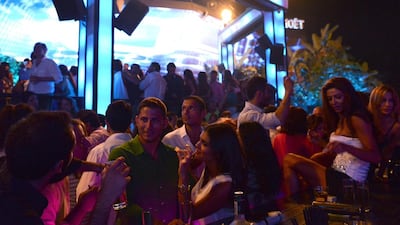BEIRUT // With her long blonde hair and immaculate make up, Zeina Kay is not going to let the violence spilling from Syria into Lebanon get in the way of her party lifestyle.
On a recent weekend in one of Beirut’s packed rooftop clubs, she danced carelessly with a large group of friends, dismissing one suitor after another as they tried to cosy up.
“If there is a bombing or something, I just stay closer to the house,” says Ms Kay, 32. “The people who party, are the people who party. Those who can afford it will continue to do so.”
Lebanon may be wracked by the war in Syria but the country’s famous nightlife shows little sign of easing up.
Ms Kay is a typical patron at the Stereo Kitchen nightclub. She works hard during the week for a construction company, goes out every weekend and money does not appear to be an object.
The increasing levels of violence, an influx of more than 1.1 million refugees and a burgeoning economic crisis, have failed to dampen this city’s reputation as the Middle East’s party capital.
That Beirut will keep on partying, no matter how bad the situation, is a cliché promoted by the Lebanese themselves.
Affluent Beirutis frame their partying as a form of resilience, even as a pillar of their Lebanese identity, says Nicolien Kegels an anthropologist based in Cairo. “The image they propagate is that you don’t let your life be interrupted by things like politics or conflict. A real Lebanese keeps on living.”
The narrative of resilience through partying first started during the country’s 15-year civil war. Lebanese like Naji Gebran saw music as a form of therapy, and started underground parties. His BO18 club, the post war reincarnation built on a former mass grave, still has people queuing up outside decades later.
Many of those who continue to spend money in the hundreds of nightclubs and bars believe that the inflammatory situation fuels the nightlife.
“It’s difficult to think about throwing a party when people die in the morning,” said Yousef Harati, a nightlife veteran in the city who started the club Behind the Green Door six years ago. “Sadly, usually those are the best parties. The people that are there, really want to be there.”
That is exactly the kind of talk that has many locals rolling their eyes. The lifestyle of this monied elite is out of reach for most Lebanese, and strictly limited to the capital, says Marina Chamma, a blogger at eyeontheeast.org.
“All of this talk of US$3,000-4,000 bottles of champagne, it happens of course, but they are for a very small percentage of the population and an even smaller percentage of people that visit Beirut. It’s very limited,” she says.
Yet Beirut’s nightlife has grown into a scene that caters to a far more diverse crowd. Bars open every week in the buzzing neighbourhood of Mar Mikhael where artists and students are as likely to be found as real estate tycoons.
Since Lebanon’s smoking ban started in September 2012, people have been forced from the bars onto the pavement, turning the neighbourhood – formerly known for its garages – into one big open air cafe.
Lebanon’s capital has carefully crafted an image of itself as a non-stop party destination. Skybar is one of the establishments that fuelled that reputation, with foreigners flocking to the venue where they would be entranced by leggy Lebanese girls dancing on the bar in mini skirts.
But Lebanese are not partying quite as hard as they think they are. Abraham Helal, marketing manager at Sky Management, says his group, which owns the club, is definitely feeling the pinch from the rising tension.
“Skybar only opened 3 nights a week last summer, while back in 2011, when things were good, we would be full every night,” he says. The clientele is also different; less Lebanese coming home for the holidays and tourists, more locals.
The group aims to keep pushing Lebanon as a destination, investing $10 million in another club o1ne and flying in DJs from Europe every Friday, despite the security situation. “Beirut is a showcase for the region,” Mr Helal says. So far it appears to be paying off, with the o1ne club packing 2,000 people on a recent Saturday night, many ordering buckets of champagne, which naturally come with sparklers.
Regulars call the club a stress valve. “We have to have fun to get away from all the stress and political turmoil,” says Pedro Natahan, 33, seated at his regular table beside the club’s main feature: a giant catwalk where doe-eyed women sway their hips.
Even burning tyres, a common form of protest in Beirut, are no obstacle for Lebanon’s diehard party spirit.
When Ms Kay encountered such a roadblock recently, she was unfazed. “We told them, can you move the tyres because we have to go party?” she says. “And they did.”
foreign.desk@thenational.ae

